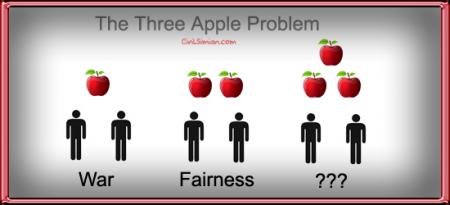You are here
The Three Apple Problem....
I'm calling this The Three Apple Problem. This is where ethics begins. Ethics develops between two people, that's the absolute minimum. You can develop some kind of ethics between you and your environment, or other animals, but, a pure human ethic will take at least two people, and the most simple example is limited at two. So that's what I used. The apple represents human necessity for one person.
One Apple Problem: Two people want one apple. If I allow the other to have the apple, I will die for sure. Therefore, the only way I can survive is to fight for the apple with the other. This is a state of war.
Two Apple Problem: Now I've got two apples, and two people. It's pretty straight forward. If you value life in itself, then it's one apple for both people. If you value only your life, you may have no problem letting the other die, even though the means are there for them to live.
Three Apple Problem: This is the larger human problem. Once everybody's necessities are met, how do we distribute the surplus?
Now, as a planet we are stuck between the one apple problem, and the second. Some people are talking, and have been talking about the 3 apple problem for hundreds of years, but it's just speculative because we can't seem to convince some of the people to move away from the one apple problem. In refusing to elevate from one apple to two apples they keep the world in a state of conflict and war. A humanist understands that in order to value life itself, at a minimum we have to respect and solve the two apple problem.
Because I understand how Humanism works from this perspective, I'm not tied to historical category, or generality. I can look at a complex issue, and tell whether the person, group, or even state is caught at one, two, or three. Never allow yourself to fall below the two apple equilibrium. If the resources are under your power, there are ethical implications. We are part of a limited system. This implies a conscious morality.

- Log in to post comments
Site by Albany Media